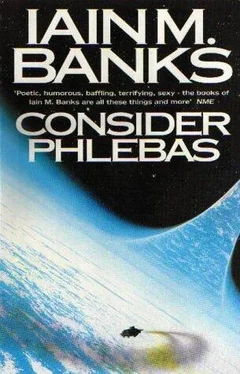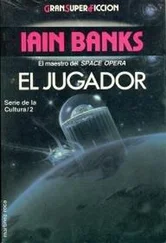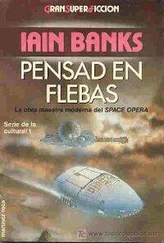Xoralundra stamped off down the corridor. Horza stood for a moment, looking first at the rapidly receding Querl, then at the guard as he checked his carbine, ordered the cell door to open, and stepped inside. Then the man ran down the corridor after the old Idiran.
“Querl!” gasped the medjel as it skidded to a stop by the airlock, the suit helmet held in front of it. Xoralundra swept the helmet from its grasp and fitted it quickly over Horza’s head.
“You will find a warp attachment in the lock,” the Idiran told Horza. “Get as far away as possible. The fleet will be here in about nine standard hours. You shouldn’t have to do anything; the suit will summon help on a coded IFF response. I, too—” Xoralundra broke off as the cruiser lurched. There was a loud bang and Horza was blown off his feet by a shock wave, while the Idiran on his tripod of legs hardly moved. The medjel which had gone for the helmet yelped as it was blown under Xoralundra’s legs. The Idiran swore and kicked at it; it ran off. The cruiser lurched again as other alarms started. Horza could smell burning. A confused medley of noises that might have been Idiran voices or muffled explosions came from somewhere overhead. “I too shall try to escape,” Xoralundra continued. “God be with you, human.”
Before Horza could say anything the Idiran had rammed his visor down and pushed him into the lock. It slammed shut. Horza was thrown against one bulkhead as the cruiser juddered mightily. He looked desperately round the small, spherical space for a warp unit, then saw it and after a short struggle unclamped it from its wall magnets. He clamped it to the rear of his suit.
“Ready?” a voice said in his ear.
Horza jumped, then said, “Yes! Yes! Hit it!”
The airlock didn’t open conventionally; it turned inside out and threw him into space, tumbling away from the flat disc of the cruiser in a tiny galaxy of ice particles. He looked for the Culture ship, then told himself not to be stupid; it was probably still several trillion kilometres away. That was how divorced from the human scale modern warfare had become. You could smash and destroy from unthinkable distances, obliterate planets from beyond their own system and provoke stars into novae from light-years off… and still have no good idea why you were really fighting.
With one last thought for Balveda, Horza reached until he found the control handle for the bulky warp unit, fingered the correct buttons on it, and watched the stars twist and distort around him as the unit sent him and his suit lancing away from the stricken Idiran spacecraft.
He played with the wrist-set for a while, trying to pick up signals from The Hand of God 137 , but got nothing but static. The suit spoke to him once, saying “Warp/unit/charge/half/exhausted.” Horza kept a watch on the warp unit via a small screen set inside the helmet.
He recalled that the Idirans said some sort of prayer to their God before going into warp. Once when he had been with Xoralundra on a ship which was warping, the Querl had insisted that the Changer repeat the prayer, too. Horza had protested that it meant nothing to him; not only did the Idiran God clash with his own personal convictions, the prayer itself was in a dead Idiran language he didn’t understand. He had been told rather coldly that it was the gesture that mattered. For what the Idirans regarded as essentially an animal (their word for humanoids was best translated as “biotomaton”), only the behaviour of devotion was required; his heart and mind were of no consequence. When Horza had asked, what about his immortal soul? Xoralundra had laughed. It was the first and only time Horza had experienced such a thing from the old warrior. Whoever heard of a mortal body having an immortal soul?
When the warp unit was almost exhausted, Horza shut it off. Stars swam into focus around him. He set the unit controls, then threw it away from him. They parted company, he moving slowly off in one direction, while the unit spun off in another; then it disappeared as the controls switched it back on again to use the last of its power leading anybody following its trace away in the wrong direction.
He calmed his breathing down gradually; it had been very fast and hard for a while, but he slowed it and his heart deliberately. He accustomed himself to the suit, testing its functions and powers. It smelled and felt new, and looked like a Rairch-built device. Rairch suits were meant to be among the best. People said the Culture made better ones, but people said the Culture made better everything, and they were still losing the war. Horza checked out the lasers the suit had built in and searched for the concealed pistol he knew it ought to carry. He found it at last, disguised as part of the left forearm casing, a small plasma hand gun. He felt like shooting it at something, but there was nothing to aim at. He put it back.
He folded his arms across his bulky chest and looked around. Stars were everywhere. He had no idea which one was Sorpen’s. So the Culture ships could hide in the photospheres of stars, could they? And a Mind — even if it was desperate and on the run — could jump through the bottom of a gravity-well, could it? Maybe the Idirans would have a tougher job than they expected. They were the natural warriors, they had the experience and the guts, and their whole society was geared for continual conflict. But the Culture, that seemingly disunited, anarchic, hedonistic, decadent mélange of more or less human species, forever hiving off or absorbing different groups of people, had fought for almost four years without showing any sign of giving up or even coming to a compromise.
What everybody had expected to be at best a brief, limited stand, lasting just long enough to make a point, had developed into a wholehearted war effort. The early reverses and first few megadeaths had not, as the pundits and experts had predicted, shocked the Culture into retiring, horrified at the brutalities of war but proud to have put its collective life where usually only its collective mouth was. Instead it had just kept on retreating and retreating, preparing, gearing up and planning. Horza was convinced the Minds were behind it all.
He could not believe the ordinary people in the Culture really wanted the war, no matter how they had voted. They had their communist Utopia. They were soft and pampered and indulged, and the Contact section’s evangelical materialism provided their conscience-salving good works. What more could they want? The war had to be the Minds’ idea; it was part of their clinical drive to clean up the galaxy, make it run on nice, efficient lines, without waste, injustice or suffering. The fools in the Culture couldn’t see that one day the Minds would start thinking how wasteful and inefficient the humans in the Culture themselves were.
Horza used the suit’s internal gyros to steer himself, letting him look at every part of the sky, wondering where, in that light-flecked emptiness, battles raged and billions died, where the Culture still held and the Idiran battle fleets pressed. The suit hummed and clicked and hissed very quietly around him: precise, obedient, reassuring. Suddenly it jolted, steadying him without warning and jarring his teeth. A noise uncomfortably like a collision alarm trilled violently in one ear, and out of the corner of his eye Horza could see a microscreen set inside the helmet near his left cheek light up with a holo red graph display.
“Target/acquisition/radar,” the suit said. “Incoming/increasing.”
“What!” roared Horza.
“Target/acqui—” the suit began again.
“Oh shut up!” Horza shouted, and started punching buttons on the suit’s wrist console, twisting this way and that, scanning the darkness around him. There ought to have been a way of getting a head-up display on the inside of the helmet visor to show him what direction the signals were coming from, but he hadn’t enough time to familiarise himself completely with the suit, and he couldn’t find the right button. Then he realised he could probably just ask. “Suit! Give me a head-up on the transmission source!”
Читать дальше












